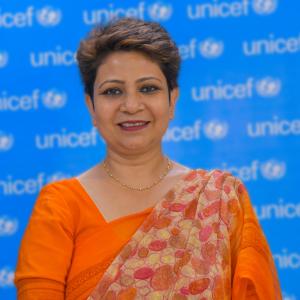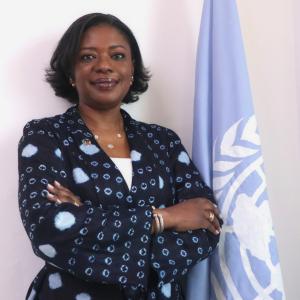UNICEF and UNFPA alarmed by proposed repeal of law banning FGM in The Gambia
22 March 2024
Joint statement by UNICEF Representative in The Gambia, Nafisa Binte Shafique, and UNFPA Representative in The Gambia, Ndeye Rose Sarr
BANJUL, THE GAMBIA, 22 March 2024 - “As the debate over the proposed repeal of the law banning Female Genital Mutilation (FGM) intensifies, we are deeply concerned by the potential reversal of decades of work invested in protecting the rights and dignity of women and girls.
“The proposed repeal of the ban on FGM, referred to as female circumcision in the 2015 Women’s (Amendment) Act, is a severe violation of human rights, and a setback in the global fight against gender-based violence. This move not only disregards the immense suffering experienced by survivors of FGM, but also undermines the progress made in raising awareness, changing attitudes, and mobilizing communities to abandon this harmful practice. It sends a message that the rights and dignity of girls and women are expendable, perpetuating a cycle of discrimination and violence that has no place in a just and equitable society.
“The introduction of the ban on FGM in The Gambia in 2015 represents a significant milestone in the country's efforts to safeguard the rights and well-being of its female population, and was seen as a model of progressive legislation worldwide. It serves as a beacon of hope for countless girls, many without a voice, who faced the risk of undergoing this traumatic procedure, and it signalled the government's commitment to ending the harmful practice.
“Repealing this law will set a dangerous precedent and make The Gambia the first country in the world to have stepped back from such commitments.
“The Gambia is signatory to multiple international instruments that uphold and protect the rights of women and girls. Therefore, we firmly call on the government to uphold its obligations under international human rights law and maintain the ban on FGM. We also urge the government to strengthen its efforts to prevent and address the practice through robust enforcement mechanisms, and targeted interventions with communities, including men and boys, as well as strengthening health services, and expanding opportunities for women and girls, to address the root causes.
“We stand in solidarity with survivors, activists, civil society organizations, faith-based organizations, and all those working tirelessly to end this human rights violation. Together, we must redouble our efforts to protect the rights and dignity of girls and women everywhere and ensure a future free from the harmful practice of FGM.”

Ms. Nafisa Binte Shafique
Prior to joining UNICEF The Gambia Country Office on December 01 2023, Ms. Shafique served as UNICEF Chief of Field Office, Bihar, India from December 2020 to November 2023. Before that, she had also served as UNICEF Chief of Field Office, Homs and Hama, Syria from 2016-2018 and UNICEF Deputy Representative in Sudan (2018-2020) and Azerbaijan (2014-2016).
Ms. Shafique has a long experience of working in the humanitarian and development sector. She started her UNICEF career as a national officer in Bangladesh 20 years ago and has since served the organization in different capacities, including as Chief of HIV and AIDS section in Kathmandu, Nepal, Chief of Adolescent Development and Participation in Kathmandu, Nepal, Head of Adolescent HIV Prevention in Lesotho, and Child Protection Officer (Adolescent Development) in Dhaka, Bangladesh.
She has also worked in other organizations, including UNFPA, Expressions Ltd. (a leading social communication agency in Bangladesh), as well as national and international NGOs like Save the Children. Her major areas of expertise are Adolescent Development and Participation, (ADAP), HIV and AIDS, Social and Behavior Change and Gender.
Ms. Shafique is a citizen of Bangladesh and holds a master’s degree in Development Studies from the Institute of Social Studies, The Netherlands, as well as in Social Science from University of Dhaka, Bangladesh.

Before joining UNFPA, Ms. Sarr gathered extensive programme management experience from the nonprofit sector and through her previous roles at UN Women and UNDP. She has administered multiple grants for programs in Asia and Africa related to capacity building of civil society organisations, gender equality, violence against women, and women’s health and reproductive rights.
Ms. Sarr has field and community development experience working in Senegal her home country with the World Bank, in South Africa for the Open Society Initiative in Southern Africa (OSISA) and the German Technical Cooperation.
She undertook advocacy for the ICPD Programme of Action and the Beijing Platform of Action through programming and policy dialogue for human rights and public-private partnerships. She was part of the team that developed UNDP Gender Equality Seal and co-led the development of UNFPA’s Social and Environmental Standards for Programming.
Ms. Sarr is an engaged employee in UNFPA for staff wellbeing and development. She co-leads the employee resource group known as women@unfpa and is currently the Vice Chairperson of the Paul Hoffman Fund dedicated to supporting staff in times of financial needs.
Ms. Sarr holds a Bachelor’s Degree in Business Administration from the University of Quebec in Montreal, Canada and a Master of Arts Degree in International Relations from the Webster University in Saint Louis, Missouri. She is fluent in French and English and has a good command in Spanish.






